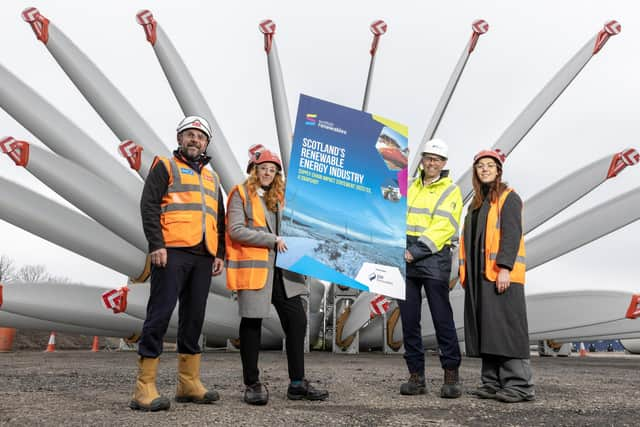20,000 jobs boost: Renewable energy 'biggest economic opportunity facing Scotland'
Almost 90 per cent of the country’s renewable energy supply chain believe the sector is the nation’s number one economic opportunity, the study for Scottish Renewables has found. It comes as the industry organisation launches the fourth edition of its supply chain impact statement - an annual showcase of the businesses and organisations working across Scotland’s renewable energy industry.
Supply chain businesses provide products and services which enable renewable energy projects to be built and operated. Examples include the Old Library, a family hotel in the Scottish Borders; Blargoans, a family-run business that provides industrial supplies, transportation and recruitment; and subsea specialist Balmoral. The impact statement highlights how the supply chain - stretching from the Borders to the Highlands and Islands - is utilising its expertise, skills and capabilities to deliver specialist work across all renewable energy technologies, including onshore and offshore wind, solar and energy storage.
Advertisement
Hide AdAdvertisement
Hide AdOf the 45 organisations featured in this year’s impact statement, 89 per cent think renewable energy is the largest economic opportunity for Scotland, 94 per cent said they have invested in upskilling as a result of clean power opportunities, while 83 per cent said they have taken on more staff as a result of industry opportunities.
Emma Harrick, head of energy transition and supply chain at Scottish Renewables, said: “Scotland’s renewable energy supply chain continues to play a vital role in delivering the major infrastructure projects, such as onshore and offshore wind farms, that will help us achieve our net-zero ambitions. The supply chain impact statement gives us a real insight into how project developers are working closely and investing in the local supply chain, from innovative start-ups to established organisations, and how businesses are supporting a renewable energy industry that 89 per cent consider to be the largest economic opportunity in Scotland.
“The businesses and organisations celebrated in the document demonstrate only a small proportion of the complex supplier network required to deploy net-zero technologies and there will be more and more opportunities for our supply chain to grow further as we build more renewable energy projects across Scotland. Our industry already supports more than 27,000 jobs and is worth £5.6 billion to the Scottish economy. With almost 22,000 undergraduates studying renewables-related subjects it is clear that we are on the road to growing the specialist supply chain we will need to fulfil the future pipeline of renewable energy projects in Scotland.”
Businesses featured in this year’s impact statement include Dundee-based Ace Aquatec, which develops innovative products in the offshore marine sectors, Peel Ports Group’s King George V Dock, on the Clyde, which supports the development and ongoing maintenance of onshore wind farms across Scotland, and StorTera, an Edinburgh-based energy storage innovator aiming to develop a truly sustainable and low-cost large-scale battery. Support for the impact statement comes from headline sponsor SSE Renewables and sponsors EDF Renewables and Ocean Winds.
Jamie Maxton, head of external affairs at SSE Renewables, said: “Scotland stands on the cusp of a once in a generation opportunity to put green jobs at the heart of its future economic prosperity - whether it’s from our mature onshore wind market, our huge potential pipeline of offshore wind, or the chance to lead the world in the development of floating offshore wind technology. Scotland needs green manufacturing jobs and we’re working tirelessly to make that happen. As a national renewable energy champion, SSE Renewables is using the strength of our enviable 8GW-plus Scottish offshore construction and development pipeline. Along with partners at the University of Strathclyde and National Manufacturing Institute Scotland, we’re also at the forefront of grasping the huge opportunities from the circular economy which could generate more than 20,000 jobs by 2035.”


Harrick added: “The renewable energy industry in Scotland really is thriving but we can’t take our eye off the ball. Both the UK and Scottish governments must work with industry to build on the successes highlighted in this statement and support the supply chain by investing in the innovation, infrastructure and technology needed to make the most of the opportunities that lie ahead of us.”
The study comes as new research suggests that although UK tech is playing a crucial role in tackling global climate change, challenges in accessing funding and finding the right talent are impeding the development of the industry. Some 62 per cent of respondents to a survey undertaken ahead of Earth Day 2023 believe that net zero is not possible without technology and 63 per cent stated that not enough focus is being given to combatting climate change as a priority.
The food tech/agritech industries were revealed as the top areas of investment for business in climate tech with 71 per cent investing in that area, followed by 47 per cent investing in energy and a similar percentage investing in biodiversity/environmental tech.
Advertisement
Hide AdAdvertisement
Hide AdTessa Clarke, co-founder of Olio, said: “2023 has been a watershed moment for climate tech, because for the first time, investment in climate tech has exceeded investment in fintech. However, this has taken place against the backdrop of an enormous decline in overall venture capital investment, meaning that far too many climate tech founders are still struggling to access the capital they need. We also need to see capital going into all areas of the net zero revolution, not just the energy transition.”
Comments
Want to join the conversation? Please or to comment on this article.